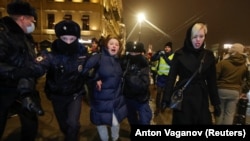Russian law enforcement detained over 1,165 people at impromptu demonstrations nationwide late on February 2 against the sentencing of opposition leader Aleksei Navalny to prison for nearly 3 years. The international community has condemned the sentence as a blatant civil-rights violation.
Navalny, the victim of a near-fatal Novichok nerve-agent attack, was sentenced on February 2 to 2 years and 8 months in prison for supposedly violating the terms of an earlier suspended sentence for alleged embezzlement from the French cosmetics company Yves Rocher.
The 44-year-old politician, in detention since his January 17 return to Russia from medical treatment in Germany, has already been taken into custody in a general-security prison in Russia’s Central Federal Oblast, Interfax reported. According to standard procedure, however, rights activist Olga Romanova said, that should occur only after an appeal of the sentence has been denied.
With the prison sentence, “[t]he authorities have declared war on all of society," fumed opposition politician Dmitry Gudkov, a Navalny ally. “On all of the country and the people.”
By roughly 2 a.m. on February 3, Moscow time, an estimated 1,165 people had been detained in 10 locations nationwide, the non-governmental law-enforcement monitor OVD-Info reported. As for January’s pro-Navalny rallies, most of the detentions occurred in the Russian capital (946) and St. Petersburg (207).
Shortly after news broke about the protest plans, scores of riot police took up position on Moscow's Manezhnaya Ploshchad to block entrance to the Kremlin and Red Square, and other usual gathering places for protesters throughout the city’s center.
On Petrovsky Pereulok, about a 20-minute walk from Manezhnaya, riot police swooped down on a long column of protesters chanting “Russia without Putin!” and “We’re in charge here!”
Pursuing protesters in a building’s courtyard, one riot police officer struck a journalist filming the detentions on the forehead with his truncheon. The journalist, Fyodor Khudokormov of the Real View YouTube channel, claimed that the officer repeated the blow after he had shown him his press card.
Khudokormov briefly blacked out before being revived with water. He told Current Time that he intends to file a complaint about the officer’s behavior, though the man wore no identifying tags.
Detainees from the courtyard stood in line to wait for a police van, as each filled completely. Riot police attempted to block media from approaching the vans.
Watch: Live Coverage Of Moscow's February 2 Navalny Protests
“It’s not normal, not civilized, not acceptable,” Moscow City Duma deputy Darya Besedina, a member of the liberal Yabloko Party, commented about the police crackdown.
Throughout February 2, rights activists have reported that Moscow’s detention centers already cannot accommodate the 1,871 detainees from the January 31 rally for Navalny’s release. Places to sleep and meals often do not exist, they say. Consequently, some of these detainees have reportedly been dispatched to prisons in neighboring regions.
But the prospect of being crammed into an overflowing detention center did not appear to discourage demonstration participants.
Asked why he had decided to join the late-night demonstration, one young man responded, “Because a person was sentenced to prison for nothing. It’s not possible to sit at home.”
Another, wearing the Russian tricolor across his shoulders, described himself as “in shock.”
“I hoped to the last moment that the court would be honest,” he said.
France, Germany, the United Kingdom, and the United States have all condemned Navalny’s sentence as a violation of civil rights.
“Today’s perverse ruling, targeting the victim of a poisoning rather than those responsible, shows Russia is failing to meet the most basic commitments expected of any responsible member of the international community,” stated British Foreign Secretary Dominic Rabbe.
U.S. Secretary of State Anthony Blinken tweeted for the release of “all those wrongfully detained for exercising their rights.”
In his first phone call with President Vladimir Putin, U.S. President Joe Biden on January 26 had called for Navalny’s immediate release from prison.
Navalny’s non-profit Anti-Corruption Foundation has urged the U.S. to implement sanctions against 35 individuals it identified as close to President Vladimir Putin, whom it blames for the Novichok attack on Navalny. The Russian leader denies the allegation.
After warning Western countries not to interfere in Russia’s domestic affairs, the Kremlin fell silent once the February 2 nighttime protests began. The state-run RIA Novosti news agency, however, described the police crackdown in Moscow as a response to an unauthorized demonstration that, it claimed, blocked traffic.
Along Tverskaya Ulitsa, a key traffic artery leading away from the city’s Manzezhnaya Ploshchad, however, multiple cars honked their horns in support of the protesters.
In remarks to Current Time, former U.S. Ambassador to Russia Michael McFaul called the sentencing of Navalny “a sorrowful day for Russia” that marked “a step back” from hopes for its democratization.
“It’s already a crueler, completely dictatorial system,” said McFaul, in comparison with his 2012-2014 posting to Moscow.
He dismissed as “nonsense” claims by pro-government Russian media that the United States is financing Navalny and provoking protests in his favor in order to sow chaos.
“Russian citizens are not as stupid as the Kremlin supposes,” he responded. “They understand what’s going on.”
Ultimately, stressed Gudkov, the outcome of the struggle over Navalny depends on Russians themselves, rather than the West.
“I assure you that the majority of people do not want to live in such a state,” he said.
Correction: This story earlier stated, based on a television report, that the United States had warned against potential sanctions in response to Aleksei Navalny's sentencing. That information was incorrect and has been removed.





